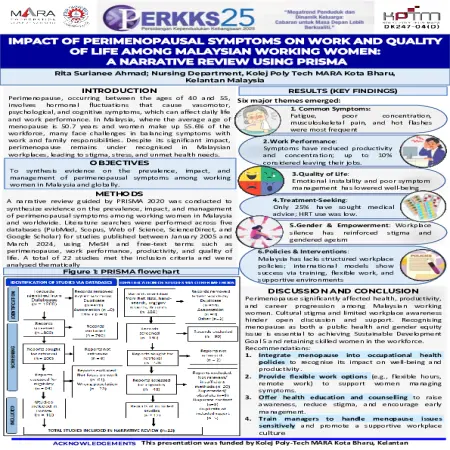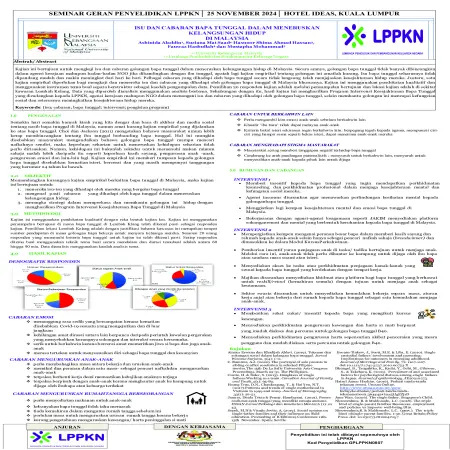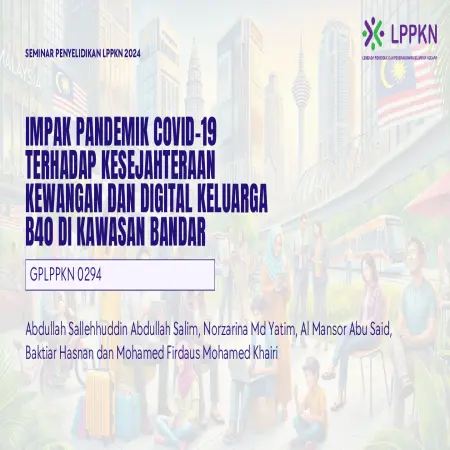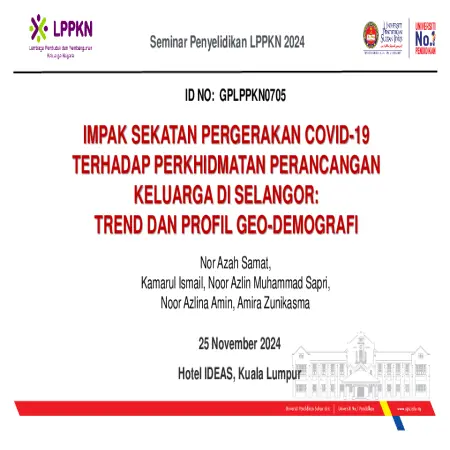Browse by Author
|
|
Impact of perimenopausal symptoms on work and quality of life among Malaysian working women: a narrative review using prisma
Item Type: Scientific Poster
Editor:
Year: 00/11/2025
Abstract: Perimenopause, occurring between the ages of 40 and 55, involves hormonal fluctuations that cause vasomotor, psychological, and cognitive symptoms, which can affect daily life and work performance. In Malaysia, where the average age of menopause is 50.7 years and women make up 55.6% of the workforce, many face challenges in balancing symptoms with work and family responsibilities. Despite its significant impact, perimenopause remains under recognised in Malaysian workplaces, leading to stigma, stress and unmet health needs.
|
|
|
|
|
|
Isu dan cabaran bapa tunggal dalam meneruskan kelangsungan hidup di Malaysia
Item Type: Scientific Poster
Editor:
Year: 00/11/2024
Abstract: This study aims to examine the issues and challenges faced by single fathers in Malaysia in sustaining their livelihoods. Generally, single fathers are not discussed as much by government agencies or NGOs when compared to single mothers, and empirical research on this group is also quite limited. The issue of single fathers should not be taken lightly, as it is increasing day by day. The various challenges faced by single fathers have indirectly affected their overall well-being. Therefore, an empirical study is needed to investigate and explore the issues and challenges encountered by single fathers in Malaysia. This study uses a qualitative approach with semi-structured interviews as the data collection method. A total of 20 respondents were selected through purposive sampling, and the study was conducted in the Klang Valley area. The data obtained was analyzed using thematic analysis. The findings of this study resulted in the proposal of an Intervention Program for the Well-being of Single Fathers, which can be suggested to LPPKN, government agencies, or NGOs to address the issues and challenges faced by single fathers, while also helping this group achieve social functionality and ultimately improve their quality of life.
|
|
|
|
|
|
Impak pandemik covid-19 terhadap kesejahteraan kewangan dan digital keluarga B40 di kawasan bandar
Item Type: Conference or Workshop Item
Editor:
Year: 00/11/2024
Abstract: The pandemic and Movement Control Order (MCO) put significant pressure on low-income (B40) families in urban areas. Urban B40 families are exposed to the economic and digital impacts of the pandemic. The objective of the study is to examine the relationship between government assistance and the financial well-being of urban B40 families, as well as to assess the relationship between government assistance and the digital well-being of urban B40 families. The pandemic and MCO have had a profound effect on urban B40 families. Immediate action is needed to ensure their financial and digital well-being.
|
|
|
|
|
|
Impak sekatan pergerakan Covid-19 terhadap perkhidmatan perancangan keluarga di Selangor: trend dan profil geo-demografi
Item Type: Conference or Workshop Item
Editor:
Year: 00/11/2024
Abstract: This study aims to identify the trends in contraceptive use among new users before, during, and after the Movement Control Order (MCO), as well as to determine the distribution of contraceptive use among new users based on radius and origin. Additionally, it seeks to assess the percentage differences in new contraceptive users between the years 2020 and 2019. The findings show that there were no new contraceptive users during the MCO period (March 18 – May 3, 2020). Implants emerged as the preferred family planning method among clients at the Klinik Nur Sejahtera Selangor, while condoms were the least used method. The 'Long Married Mothers' profile refers to women who have been married for 14 to 22 years. This group may have chosen not to have children, and using contraceptives is seen as the best alternative. The geo-demographic profile and the distribution map of contraceptive users developed in this study can serve as a guide for planning and decision-making, such as health policies, educational programs, population projections, reproductive health research, and family planning.
|
|
|
|
|
|
Indeks Kesejahteraan Keluarga Malaysia (IKK) 2019 & 2022 : perbandingan skor keseluruhan, domain dan indikator (Malaysia dan Johor)
Item Type: Infographic
Editor:
Year: 00/11/2024
Abstract: The overall IKK score for Malaysia is 7.72 (2019) while the score for 2022 is 7.93. The overall score of IKK for the State of Johor is 7.85 in 2019 and the overall score of IKK in 2022 has increased to 7.88.
|
|
|
|
|
|
Indeks Kesejahteraan Keluarga Malaysia (IKK) 2019 & 2022 : perbandingan skor keseluruhan, domain dan indikator (Malaysia dan Kedah)
Item Type: Infographic
Editor:
Year: 00/11/2024
Abstract: The overall IKK score for Malaysia is 7.72 (2019) while the score for 2022 is 7.93. The overall score of IKK for the State of Kedah is 7.79 in 2019 and the overall score of IKK in 2022 has increased to 8.04.
|
|
|
|
|
|
Indeks Kesejahteraan Keluarga Malaysia (IKK) 2019 & 2022 : perbandingan skor keseluruhan, domain dan indikator (Malaysia dan Kelantan)
Item Type: Infographic
Editor:
Year: 00/11/2024
Abstract: The overall IKK score for Malaysia is 7.72 (2019) while the score for 2022 is 7.93. The overall score of IKK for the State of Kelantan is 7.43 in 2019 and the overall score of IKK in 2022 has increased to 7.97.
|
|
|
|
|
|
Indeks Kesejahteraan Keluarga Malaysia (IKK) 2019 & 2022 : perbandingan skor keseluruhan, domain dan indikator (Malaysia dan Melaka)
Item Type: Infographic
Editor:
Year: 00/11/2024
Abstract: The overall IKK score for Malaysia is 7.72 (2019) while the score for 2022 is 7.93. The overall score of IKK for the State of Melaka is 7.99 in 2019 and the overall score of IKK in 2022 has decreased to 7.83.
|
|
|
|
|
|
Indeks Kesejahteraan Keluarga Malaysia (IKK) 2019 & 2022 : perbandingan skor keseluruhan, domain dan indikator (Malaysia dan Negeri Sembilan)
Item Type: Infographic
Editor:
Year: 00/11/2024
Abstract: The overall IKK score for Malaysia is 7.72 (2019) while the score for 2022 is 7.93. The overall score of IKK for the State of Negeri Sembilan is 8.03 in 2019 and the overall score of IKK in 2022 has decreased to 8.00.
|
|
|
|
|
|
Indeks Kesejahteraan Keluarga Malaysia (IKK) 2019 & 2022 : perbandingan skor keseluruhan, domain dan indikator (Malaysia dan Pahang)
Item Type: Infographic
Editor:
Year: 00/11/2024
Abstract: The overall IKK score for Malaysia is 7.72 (2019) while the score for 2022 is 7.93. The overall score of IKK for the State of Pahang is 7.70 in 2019 and the overall score of IKK in 2022 has increased to 8.19.
|
|
|
|














